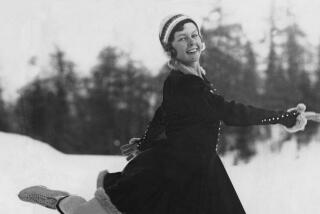Just another stage for these coaches without borders
- Share via
Reporting from Vancouver, Canada — If nothing else, Patrick Brown will leave the Olympics with a taste for rice and kimchi.
And some Korean vocabulary too. He knows the words for “left” and “right,” “up” and “down.”
“Enough to do my job,” he says.
Such is the life of an itinerant bobsled coach.
After guiding teams from Jamaica and Greece through past Winter Games, Brown now wears the red and blue of South Korea, whose four-man crew he has trained for several years.
“I guess it doesn’t matter what the nation is,” the Utah man said. “If you’ve been working with a group, the pride is pretty great.”
Though the sports world still looks askance at athletes who switch allegiances to compete under another flag, coaches as hired guns are widely accepted.
At the Vancouver Games, a Canadian man guided the Swedish moguls skiers against his native country, an Austrian headed the Italian Nordic combined team and a Liechtensteiner oversaw the U.S. luge program.
Figure skating was particularly rife with border crossings, top competitors choosing from a handful of established names.
“It happens all the time,” said David Wallechinsky, who co-wrote “The Complete Book of the Winter Olympics.” “There are no rules about coaches.”
With little background in winter sports, China has made a habit of pilfering coaches from other nations, paying them to bolster its nascent programs.
“We’re all the same,” said Dan Rafael, a Canadian who led the Chinese women to bronze in curling. “We all want to win.”
Mercenary coaches date to the early 1900s, an early example made famous by the Oscar-winning film “Chariots of Fire.”
British sprinter Harold Abrahams, frustrated by his inability to break through in the 100-meter dash, quietly employed professional trainer Sam Mussabini.
Officials at the University of Cambridge, where Abrahams studied, were not pleased. “I can close my eyes and see the president of Cambridge wagging his finger at this boy,” said John Lucas, an Olympics scholar and professor emeritus at Penn State.
But the move paid off as Mussabini guided Abrahams to gold at the 1924 Summer Games in Paris. All these years later, no one thinks twice about shopping for expertise on the open market.
And with a limited number of jobs to be had, coaches are willing to relocate.
When South Korea let go of short-track skating coach Jae Su Chun before the 2006 Turin Olympics, he switched to Canada and then to the U.S., installing many of the training techniques that had made his native country a powerhouse.
Wolfgang Schaedler spoke no English when he retired from competition and moved across the Atlantic to take over the American luge program. Tristan Gale, who won gold for the U.S. in skeleton at the 2002 Salt Lake City Olympics, traveled the opposite direction to help the French.
Some coaches don’t need to relocate; athletes come to them. This is especially true in sports such as bobsled and ski jumping, where developing nations lack the required training facilities.
So, despite the fact he has worn a different uniform in each of his three Olympics, Brown has done almost all of his work from home.
As a development coach at the Utah Olympic Park, he helps anyone who asks.
“This has been a great Olympics for me,” he said. “Not only have I worked with half of these athletes from different nations, I’ve also worked with a lot of the U.S. sliders.”
The job can be challenging. Mercenary coaches often deal with language barriers and athletes who lack international experience. Taking over the men’s and women’s curling teams in China, Rafael realized his sport did not quite translate onto foreign ice.
“In curling, you have to control your emotions,” he said. “When I first met the teams, they were like hockey players, they were always excited. You had to calm them down, and sometimes they calm down too much, but what are you going to do?”
The Montreal native also has clashed with Chinese officials, especially at these Games.
First, Rafael bristled when they tried to stop his players from talking to reporters. Then he ran into trouble with his superiors for criticizing his women, openly questioning their intensity.
“In North American culture, we try to light a fire under a player,” he said. “The only fire I lit was under me, so I’m going to stay away from that.”
At the sliding track, Brown has dealt with less-dramatic issues, going back to square one to teach the basics.
He never intended to do this sort of work. Shortly before the 1988 Winter Games in Calgary, after failing to make the U.S. team as an athlete, he got a call from a friend who was coaching the Jamaicans and needed to quit.
“They hired me on the spot,” Brown said. “I was 21, and it was an eye-opening experience.” That eventually led to working with the Greeks in 2002 and now the South Koreans.
“What I enjoy about these smaller nations is the respect the athletes have, their willingness to be open-minded and learn,” he said.
The same might be said for their coach. Over the last few years, Brown has picked up bits and pieces of another language. He has prepared his athletes in austere conditions in which they must fend for themselves.
“While the bobsled guys are up training, the skeleton guys are back in the condo making the meals for everyone,” he said. “When they’re training, we cook for them.”
Such is the life of an itinerant coach.
A lot of Korean barbecue. A lot of rice and kimchi.
david.wharton
@latimes.com
More to Read
Go beyond the scoreboard
Get the latest on L.A.'s teams in the daily Sports Report newsletter.
You may occasionally receive promotional content from the Los Angeles Times.







